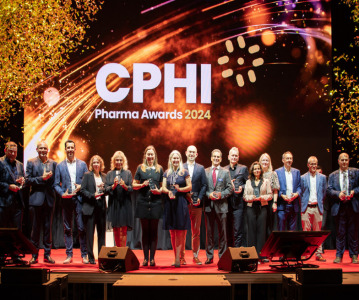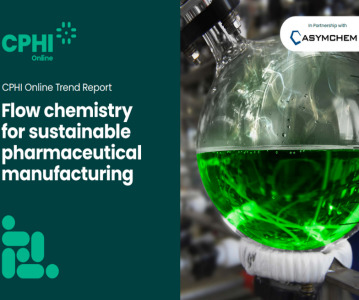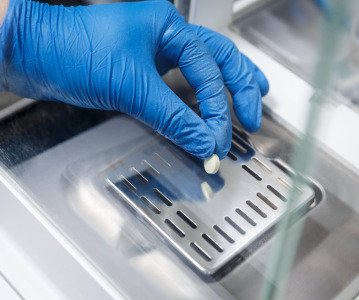CPHI Discover: Earlier partnerships between pharma and excipient manufacturers are the key to success

In the future pharma companies will need to work closer with excipient companies if we are to develop better formulations more quickly
In this second interview with Dr Iain Moore, President of EXCiPACT – ahead of his keynote session, Value Added Excipients to Unlock the Potential of APIs, on Thursday 20th May at CPHI Discover - global pharma’s largest ever virtual gathering – we explore the duality of excipient variability and QbD, as well as how pharma and biotech customers should partner earlier with excipient providers to get a better understanding of not just the chemistry and purity of ingredients, but also how excipients work best in real world formulations.
CPHI Discover: How do you think excipients fit with the drive for QbD in pharma?
Dr Iain Moore: I am a quality assurance professional, so I will say that putting time into design will always pay you back in quality terms in your operations. That is, after all, the essence of validation throughout the industry, which is to ensure that the design phase of whatever that is your doing is being controlled and the science is fully understood. I think what we need, or what QbD perhaps does not dig into enough, is how to minimize variability. Thus, for me, the big trend in excipients is how can we minimise variability.
CPHI Discover: We produced a report for CPHI recently which explored excipients, QbD, variability and the idea that sometimes an entirely pure product may lose some of the interaction that was critical to the product. How do you equate this?
Dr Iain Moore: The pursuit of purity is always important in many regards, but what I think we sometimes forget, and we get too blinkered with is; it is not purity that matters, it’s the toxicology that matters. I’ve seen examples very recently where enhanced purity has been delivered and it’s great chemically, but when we mix it with the active, the formulation stability is worse. That is very counter-intuitive. What that is suggesting to me is some concomitant component of the excipient is actually greatly beneficial in stability.
Unlike the API, excipients are often very messy chemically, with multiple components in there. The classic is Polysorbate-80 and if you put that sample in a mass spec you will get a hedgehog, and then the question is which one is the impurity? You cannot answer it because the answer is none of them, they are the excipient. Does it matter? No, because it is the mixture which gives it its performance as a surfactant, as a soluble isomer. So, in cases like this it’s vital the excipient composition is consistent, and this is one dimension of reducing variability.
CPHI Discover: Do you think Pharma needs to partner more widely?
Dr Iain Moore: Pharmaceutical companies need to exchange more information with their excipient suppliers. The critical aspect of the excipient is its performance in the formulation but that is not something the supplier can have knowledge about. Those excipient suppliers with a high scientific knowledge will have a good understanding on the key excipient properties. Certainly, when it comes to the traditional excipients, they may have decades of experience. This will help reduce variability in the formulation allowing the pharma companies to concentrate on other aspects of the drug delivery.
CPHI Discover: Should excipient manufacturers be involved earlier in product development cycles?
Dr Iain Moore: Yes, especially in formulation development. It is an area where both parties can collaborate more closely. And again, from the excipient suppliers, it is about understanding the critical properties, especially in the final product. When you utilize the excipient in the drug product formulation, you do not care what it looks like chemically, it's what it does that is important. Is it a surfactant? Is it going to solubilize the active or is it going to encapsulate it in a lipid shell for example?
The challenge is that there is often a disconnect between the properties you need for drug product delivery and those the manufacturer can control in terms of chemistry and physical properties. It is still an area of science not very well understood; why does this molecular shape have this property? But working together we can develop the science and use it to reduce variability in excipient performance – something neither can do very effectively alone.
CPHI Discover: What do you think the big trends are for the excipient market in the next, maybe two years, five years looking further ahead?
Dr Iain Moore: To predict where we're going to be in the future, we're going to have to look at the last five years, draw a line to today and extrapolate. The line has probably jumped now due to the events over the last year, but I do see more regulatory scrutiny coming for excipients. We see trends, for example, in France where we see the regulatory authority is now routinely inspecting French excipient manufacturers and the same in Brazil. So how much longer before everybody must have that on the agenda?
This also potentially means a bigger role of EXCiPACT. For example, a supplier may say ‘sure come in and audit us’, but really, they're duplicating the EXCiPACT audit. I would much rather that they invest that time coming to the supplier to discuss how to make the excipient better, how to bring it under control to reduce variability, how to improve performance. I hope in the future that we can use EXCiPACT as a certification scheme to re-purpose that time and resource to improving the overall performance of the excipient and the drug product formulation.
Overall, I think the industry should be optimistic for the next few years. If all parties come together and work constructively together; regulators, legislators, suppliers we can achieve great things. For example, if there is an urgent medical need for the new excipient, ok let us work on that together, as even the biggest pharmaceutical companies probably can’t do it all on their own anymore. To advance science more quickly, we must learn to partner earlier with the right scientists and use real world experience to ensure we develop better products and faster. And after all, with COVID, we just proved the benefits we can get from that level of collaboration in the past year.
Author Profile:
Dr. Iain Moore is President of EXCiPACT and represents IPEC Europe. Outside his role at EXCiPACT, he is Global Head of Quality Assurance at Croda Europe Ltd, a manufacturer of speciality and performance chemicals based in the United Kingdom.
Related News
-
News CPHI Pharma Awards 2024: Meet the winners from the CPHI Celebration
This year we had a lot to celebrate, the 35th Anniversary of CPHI, and our esteemed award winners, of which we included two additional categories this year, the Future Leader award, and Woman of the Year award. -
News Women in Pharma: C-Suite Journeys in Leading Diversity
In this CPHI Milan special of our monthly series, we sit down with our panel of C-suite executives speaking on the ‘Leading with Diversity: The CEO Journey’ panel at this year’s show. -
News The BIOSECURE Act: implications for the pharma supply chain
On September 9, 2024, the US House of Representatives voted to pass the bill titled the BIOSECURE Act (the Act), which lists several Chinese companies in the pharmaceutical supply chain. The Act will prohibit American companies from contracting or doin... -
Sponsored Content CPHI Online Trend Report: How can flow chemistry help businesses achieve their sustainability goals?
In our latest CPHI Online Trend Report, we partner with Asymchem to understand the innovative potential of flow chemistry for API manufacturing, especially in regards to meeting sustainability goals. -
News CPHI Milan Speaker Spotlight: CDMO relations with Pharma and Start-Ups
In the run-up to CPHI Milan, we sit down with some of the experts and thought-leaders speaking at this year’s conferences. -
News Women in Pharma: Advocating for trans healthcare in pharma
In our monthly series on women in the pharmaceutical industry, we interview leading experts in the pharmaceutical supply and value chain to discuss the importance of gender diversity in healthcare, the workplace, and beyond. -
News A Day in the Life of a Vice President in R&D & Engineering
In the Day in the Life of Series, we've already had the chance to get to know a range of people in various roles in the pharma industry. In the latest interview we get a glimpse into the R&D side of things from Jennifer Sorrells, Vice Presiden... -
News CPHI Podcast Series: analysing supplier audits with the PSCI
This episode of the CPHI Podcast Series, hosted by Digital Editor Lucy Chard, goes through the results from the recent audits from the PSCI conducted on suppliers across the pharmaceutical industry, looking into ESG outcomes.
Position your company at the heart of the global Pharma industry with a CPHI Online membership
-
Your products and solutions visible to thousands of visitors within the largest Pharma marketplace
-
Generate high-quality, engaged leads for your business, all year round
-
Promote your business as the industry’s thought-leader by hosting your reports, brochures and videos within your profile
-
Your company’s profile boosted at all participating CPHI events
-
An easy-to-use platform with a detailed dashboard showing your leads and performance





.png)

